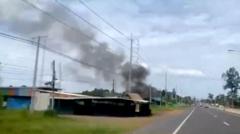On Thursday morning, mounting tensions exploded into open conflict between Thailand and Cambodia, claiming the lives of at least 12 Thai nationals, predominantly civilians, as confirmed by Thai authorities. The extent of casualties on the Cambodian side has not been disclosed.
The discord began with gunfire along the border, which escalated rapidly as Thailand accused Cambodian forces of unleashing rockets. This led to retaliatory airstrikes from Bangkok targeting Cambodian military positions. The roots of this dispute can be traced back over a century, stemming from territorial delineations established during the French colonial era in Cambodia.
In 2008, hostilities intensified when Cambodia aimed to have an 11th Century temple within the contested region listed as a UNESCO World Heritage Site—a move decried by Thailand. Sporadic violence in recent years has killed soldiers and civilians alike, yet the latest culmination of tensions started in May when a Cambodian soldier was killed, driving a wedge between the two nations and leading to reciprocal border restrictions.
On Thursday, conflicting accounts emerged surrounding the skirmish. According to the Thai National Security Council (NSC), Cambodian military drones were deployed around 07:30 local time, amid an armed build-up that included rocket-propelled grenades. Their claims suggest that Thai forces attempted negotiations, to no avail, and were forced to respond when the Cambodian military opened fire around 08:20. Thailand accused Cambodian troops of utilizing heavy artillery, resulting in substantial damage to Thai infrastructure.
Conversely, Cambodia contends that the conflict erupted when Thai soldiers breached a prior accord near a Khmer-Hindu temple, leading to an advance and the placement of barbed wire. Cambodia’s defense spokesperson asserted that the Thai army initiated the exchange, claiming they retaliated only out of self-defense.
With both parties seeking to manage the confrontation delicately, Thailand's acting premier emphasized the need for caution in line with international law. Meanwhile, Cambodian Prime Minister Hun Manet expressed a desire to resolve the issue peacefully but indicated a readiness to respond to armed aggression.
Experts believe this situation may de-escalate, as similar historical instances have in the past, although there is a noted absence of strong leadership on either side to facilitate a peaceful resolution. Travel advisories remain unissued for the general population, with caution highlighted in areas near the border. Meanwhile, China has advised its citizens in Cambodia against approaching the Thai border due to the volatile situation.

















